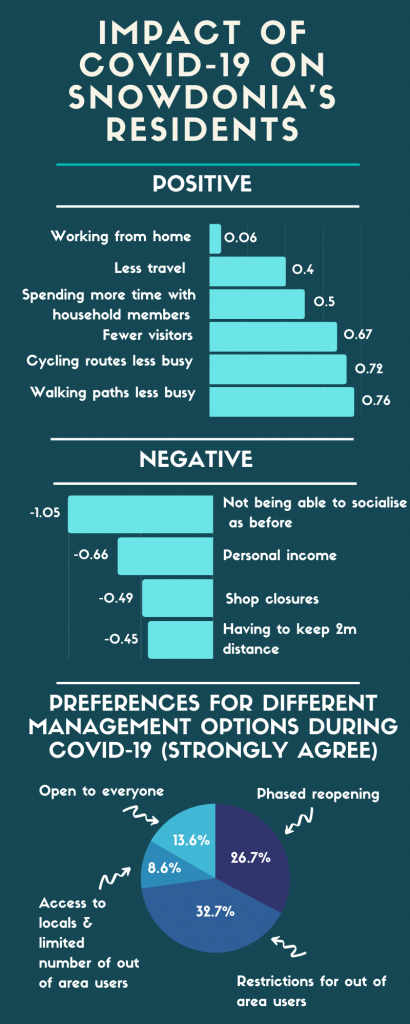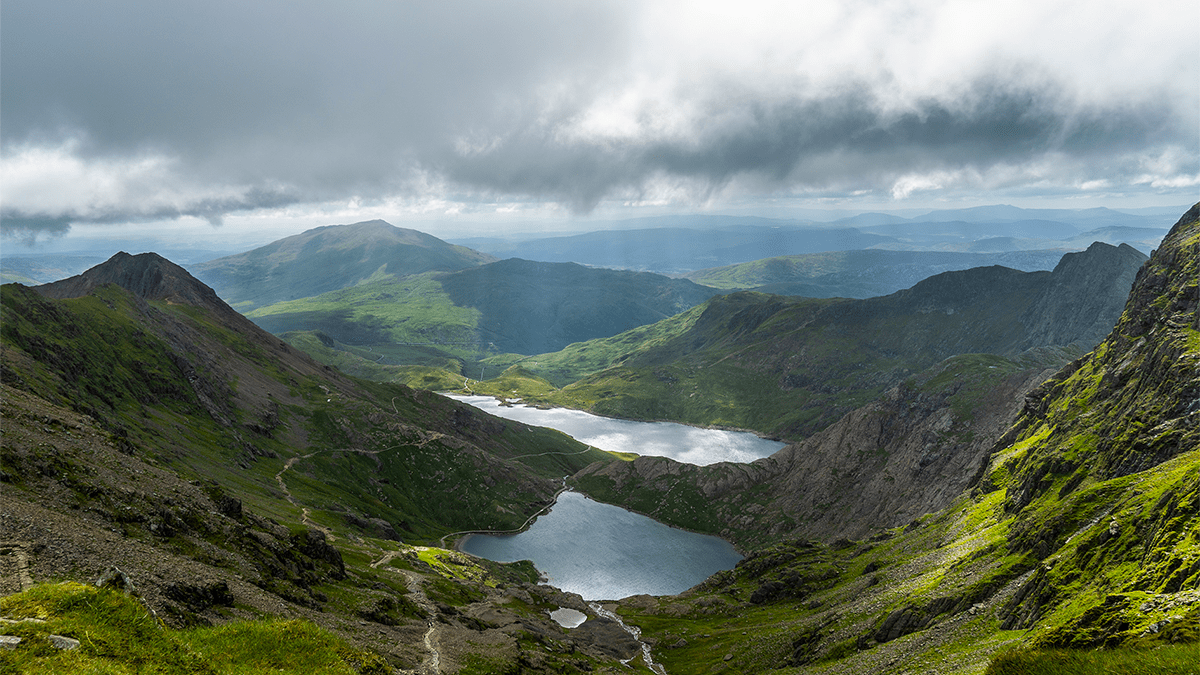Tension between locals and tourists visiting Snowdonia is at its highest after over a year of lockdown restrictions. But will the National Park be able to deal with the pressure of a seemingly restriction-free summer on the horizon?
The bendy, narrow road through Nant Peris and its rugged landscape leads you to the foot of Snowdon in Pen y Pass. Contouring along the hillside below Crib Goch, and above Llydaw Lake, it’s no wonder that the Pyg Snowdon path is popular among visitors. But after the easing of lockdown restrictions in July, visitors reached Pen y Pass to see its car park full by 7 am and around 500 cars parked dangerously along the mountain road. For locals, this is a long-existing issue that adds to their already deeply pressured relationship with tourists of the national park.
Snowdonia National Park welcomes around 10 million visitors each year across its 823 sq miles of stunning mountain ranges, ancient woodlands, natural lakes and endless beaches. But the sudden easing of lockdown restrictions in July wreaked havoc in the park, according to a Snowdon Warden. He said that many even went as far as breaking restrictions to visit the park.
“Pen y Pass and Snowdon became the epicentre of Covid,” according to Keith Ellis, who worked as a Snowdon Warden for two years until recently. “You could see it was busy, they all knew that Covid was highly infectious. But people just kept piling and piling in,” he said.
After months of being told to stay at home, the new restrictions meant that people were free to travel across Wales and through its borders. But with a rise in staycations due to Covid-19, Snowdonia became an even bigger holiday hotspot, adding to the tension between locals and tourists.
As tourist season ramped up, the tension between locals and tourists worsened as long-existing issues were brought to light. From dangerous parking to littering, the worry of Covid-19 spreading and overcrowding, locals became anxious with some not leaving their houses at all, according to a local business owner.
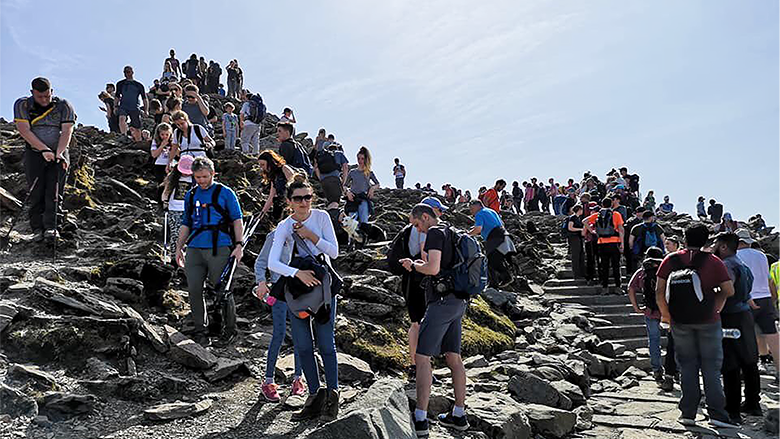
For Keith, who worked as a Snowdon Warden for two years until recently, dangerous parking around the park was one of the biggest issues his team faced, describing it as simple mayhem. Queues along miles of roads blocking any emergency vehicles that may need to pass became a common scene, according to Keith.
“Car parks filled very quickly, and they just decided to park on the road. No common sense was being applied by anybody,” he said.
Soon after, the police and the park authority devised a plan to close the car parks, set up road signs and tow cars away if they were breaking these rules. “It was the only way that was effective really,” Keith said.
A Park and Ride system was later established with services running between several of Snowdon’s surrounding villages. The chaos also brought along the introduction of a pre-booking system for the park’s busiest car park in Pen y Pass.
“The resultant rush of visitors caused a number of parking and overcrowding problems, particularly at the main Pen y Pass car park. The Snowdonia National Park team are determined not to let this happen again in 2021 as the UK comes out of lockdown for, hopefully, the last time,” the park authority said.
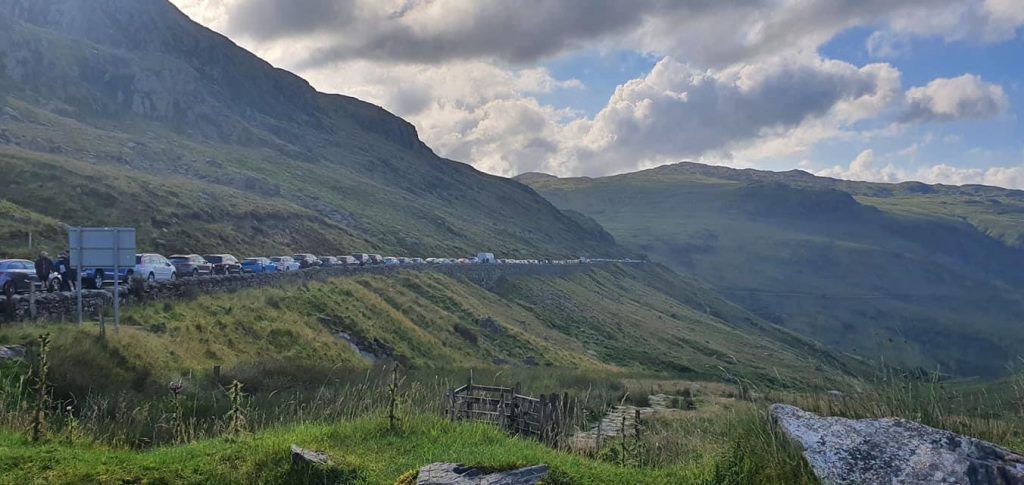
Hidden under the cover of trees, the tunnel bends on the way into the lively village of Llanberis lead you to Gallt y Glyn. Also known as Pizza and Pint, Elin Aaron the owner is apprehensive about the arrival of tourists in Snowdonia over the summer. Having spent the last peak season trying to cope with the swarms of visitors, Elin feels a storm on its way to the village and park.
“I don’t think the infrastructure in Llanberis can sustain the amount of tourists we’ve seen in the last couple of years. I think it could be a boiling point,” she said.
A recent study by Dr Nikoleta Jones found that 33% of respondents would have preferred restrictions for all out of area visitors for a longer period. Elin believes that the change in travel restrictions from not being able to leave a 5-mile radius of your home to being able to travel across and into Wales was too sudden for locals.
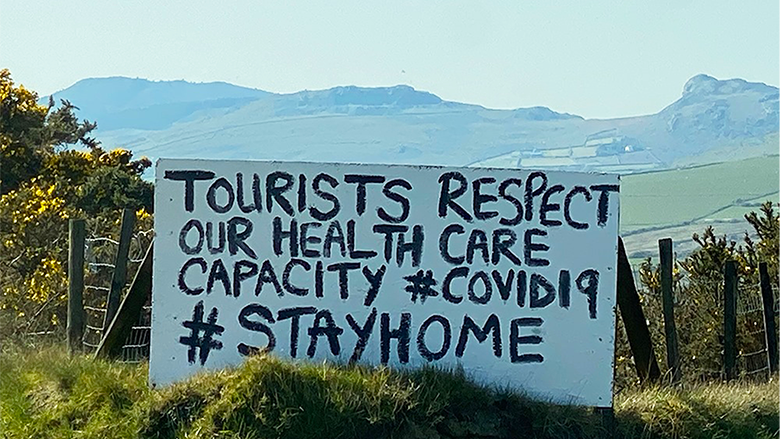
“If you’ve been trapped up for a whole year in London or Birmingham, we are so lucky with what we have that I understand that you want to come here,” Elin said. “But being local you’ve been so enclosed in this nice bubble of just us living in a beautiful place and there’s nobody around, and then everyone flocks in with no respect,” she said.
As a business owner, Elin was aware that she had a clash of interests. “I wanted them to come in, but again I live here and at one point last year I couldn’t go and see my great aunt who is 95,” she said. “But then random strangers from places where Covid rates were much higher were allowed to come and stay in my business,” she said. She felt that it was a total contradiction and a constant battle.
Dr Nikoleta Jones’ study also found that the reduction in visitors due to Covid-19 resulted in a positive experience for many of the park’s residents. Elin experienced this positivity and found herself caught in the middle ground. “I want these people to come and stay but I also want the community to feel safe and healthy, and for the community to be happy,” she said.
However, good business is essential in Snowdonia’s villages according to Keith, who used to work in a tourist-driven shop in Llanberis. He said: “If they don’t get a good season, they struggle through the winter because you don’t get people visiting.”
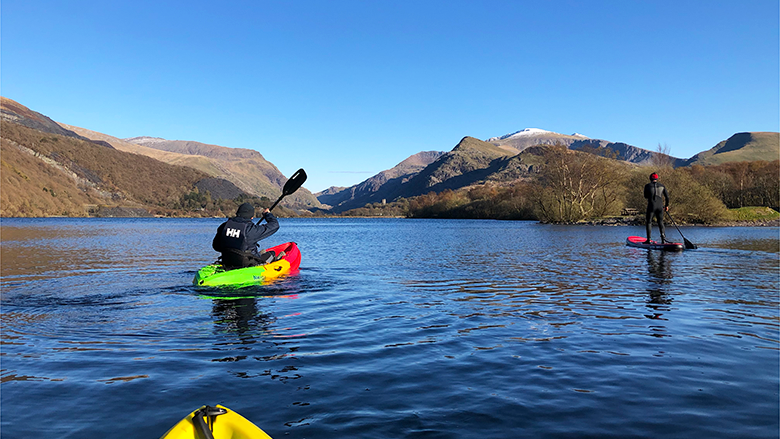
Littering along mountain slopes and the park’s beauty spots has been another prominent issue after the easing of lockdown. A charity working to protect the beauty and special qualities of Snowdonia collected around 200 bags of litter from the slopes of Snowdon last summer.
Claire Holmes, Snowdonia Society’s Engagement Officer, said: “I think the main thing is people not being able to see beyond their individualistic experience, and not seeing the National Park as somewhere that’s enjoyed by many different people.”
The society was shocked to find that even human waste was being left behind on the mountain last summer. “Last year they didn’t want to go into public toilets because they were worried about Covid, so that became a huge problem,” she said. “We’re seeing a lot more people now going to the toilet outside on footpaths which is obviously horrible,” Claire said.
As a group, they aim to educate visitors through social media and leaflets about how to be respectful when visiting Snowdonia. “We’re looking at it as a whole rather than just removing litter and not doing anything else,” she said.
“For the litter picking element, we also want to stop the problem before it even begins by putting out public messaging trying to encourage people not to drop it in the first place,” she said.
Claire believes that stopping this issue starts with teaching children a message to carry through to adulthood. “It comes down to education,” she said. “I think children are very keen, they’re like sponges aren’t they, they want to learn, they want to do the right thing,” she said.
As part of their Caru Eryri scheme, they will be sending out four groups to pick litter every week throughout the summer months this year.
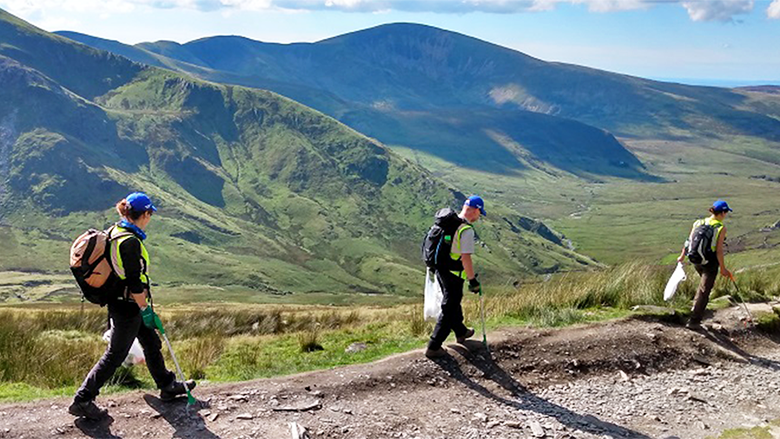
The tension between locals and tourists boils down to an overall lack of respect, according to Elin. She said: “I mean a lack of respect on so many levels. A lack of respect for the local surroundings and environment, a lack of respect for the culture, a lack of respect for the people, the community, and a lack of respect for the language.”
She feels that the lack of respect is continuously clashing with the pride locals have in their surroundings. “We then go and defend the things that we hold dear even more, and if feels like that’s lashing out. And then the tourists feel like there’s lashing out at them,” she said.
“I think that what the locals want to see is that people enjoy the local surroundings but that they respect them as well,” she said.
Although Elin is delighted with the changes and planning that have been carried out in preparation for the summer, she remains apprehensive about what this summer may bring. “It’s a worry for me that it’s so unsustainable and people coming here will not enjoy because there are so many people about and not enough space, and not enough tables in restaurants, and places to park. People will stop coming,” she said.
“I think there needs to be better management of the infrastructure,” she said.
Keith is hopeful that the park’s work over the past year will be beneficial, but how effective planning and implementation has been will not be known until the end of the high season.
